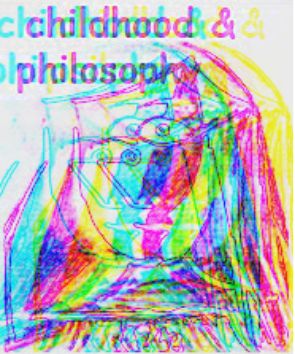the philosophy of liberation for/with children: in search of liberation and the creation of an ageless pueblo
DOI:
https://doi.org/10.12957/childphilo.2024.80981Keywords:
philosophy of liberation, childism, philosophy for/with children, liberation, puebloAbstract
From its origins, the philosophy of liberation has had both a critical and a creative aspect. The first seeks to critically examine domination, dependency, and the permanent effects of colonization. The second aims to create and re-create the liberation of peoples, developing and reconstituting ways of existing, imagining, thinking, and philosophizing that surpass colonial ways of existing, imagining, thinking, and philosophizing. Thus, for the philosophy of liberation, the liberation of peoples is distinguished from the notions of emancipation and freedom that hide reality under processes of ideologization. An example of the latter is modernity’s notion of emancipation. In this paper, I propose to approach the critical and creative function of the philosophy of liberation from a childist lens in which not only the voices of children are considered, but also the adultist and modern vision of emancipation is overcome. This will be particularly important to continue the legacy of the philosophy of liberation, and its mission to criticize and create from the political and philosophical participation of the victims in the processes of ideologization. From this legacy the children are participants, who, by engaging in pedagogical practices of liberation, act as un pueblo, a collective political actor without age. of the latter is modernity’s notion of emancipation. In this paper, I propose to approach the critical and creative function of the philosophy of liberation from a childist lens in which not only the voices of children are considered, but also the adultist and modern vision of emancipation is overcome. This will be particularly important to continue the legacy of the philosophy of liberation, and its mission to criticize and create from the political and philosophical participation of the victims of the processes of ideologization. Of this legacy, the children are participants, who, by engaging in pedagogical practices of liberation, act as un pueblo, a collective political actor without age.
Downloads
References
Allen, A. (2015). Emancipation without Utopia: Subjection, Modernity, and the Normative Claims of Feminist Critical Theory. Hypatia, 30(3), 513–529. https://doi.org/10.1111/hypa.12160
Beorlegui, C. (2010). Historia del pensamiento filosófico latinoamericano: Una búsqueda incesante de la identidad (3rd ed., Vol. 34). Publicaciones de la Universidad de Deusto.
Biswas, T., Wall, J., Warming, H., Zehavi, O., Kennedy, D., Murris, K., Kohan, W., Saal, B., & Rollo, T. (2023). Childism and philosophy: A conceptual co-exploration. Policy Futures in Education, 22(5), 741–759. https://doi.org/10.1177/14782103231185178
De la Garza, M. (2018). Education for Liberation. In M. Laverty & M. Gregory (Eds.), In community of inquiry with Ann Margaret Sharp: childhood, philosophy and education. Routledge.
Dussel, E. D. (1973). Para una ética de la liberación latinoamericana Tomo I. Siglo XXI Argentina Editores S. A.
Dussel, E. D. (1985). Philosophy of Liberation (A. Martinez & C. Morkovsky, Trans.). Orbis Books.
Dussel, E. D. (1993). 1492: El Encubrimiento del Otro: Hacia el origen del mito de la modernidad. Nueva Utopía.
Dussel, E. D. (2008). Twenty theses on politics. Duke University Press.
Dussel, E. D. (2016). Transmodernidad e interculturalidad. Astrágalo. Cultura de La Arquitectura y La Ciudad, 21, 31-54. https://doi.org/10.12795/astragalo.2016.i21.02
Ellacuría, I. (1985). Función liberadora de la filosofía. Estudios Centroamericanos (ECA). 45-64.
Ellacuría, I. (2013). The Liberating Function of Philosophy. In M. E. Lee (Ed.), Ignacio Ellacuría: Essays on History, Liberation, and Salvation (pp. 93–119). Orbis Books.
Freire, P. (2005). Pedagogy of the Oppressed (M. Bergman Ramos, Trans.). Continuum.
Funston, J. (2017). Toward a Critical Philosophy for Children. PSU McNair Scholars Online Journal, 11(1), 1–17. https://doi.org/10.15760/mcnair.2017.05
Kohan, W. O. (2011). Childhood, Education and Philosophy: Notes on Deterritorialisation. Journal of Philosophy of Education, 45(2), 339-357.
Kohan, W. O. (2015). Inventar o errar al filosofar con niñas y niños en América Latina: Lecciones de una maestra. Revista Internacional de Filosofía Aplicada, 6, 147–160.
Kohan, W. O. (2018). Paulo Freire and Philosophy for Children: A Critical Dialogue. Studies in Philosophy and Education, 37(6), 615–629.
Kohan, W. O. (2020). Paulo Freire: otras infancias para la infancia. Praxis & Saber, 11(25), 279–316. https://doi.org/10.19053/22160159.v11.n25.2020.10482
Lipman, M. (1988). Philosophy goes to school. Temple University Press.
Lipman, M., Sharp, A. M., & Oscanyan, F. S. (1980). Philosophy in the classroom. Temple University Press.
Lugones, M. (2008). The Coloniality of Gender. Worlds & Knowledges Otherwise, 1–17.
Mignolo, W. (2010). Desobediencia epistémica. Retórica de la modernidad, lógica de la colonialidad y gramática de la descolonialidad. Del Signo.
O’ Gorman, E. (1995). La invención de América. Fondo de cultura económica.
Padilla Rosas, E. J. (2023a). From Neutrality to Intentionality: Notes for a Philosophy of Liberation for/with Children. Analytic Teaching and Philosophical Praxis, 43(1), 15–25. Retrieved from https://journal.viterbo.edu/index.php/atpp/article/view/1226
Padilla Rosas, E. J. (2023b). U.S. Americanization in Puerto Rico’s Public Schools: Proposing Children’s Self-Organization for Decoloniality Through Photovoice and Philosophy for/with Children. Analytic Teaching and Philosophical Praxis, 43(2), 1–11. Retrieved from https://journal.viterbo.edu/index.php/atpp/article/view/1233
Quijano, A. (2000). Coloniality of power and Eurocentrism in Latin America. International Sociology, 15(2). https://doi.org/10.1177/0268580900015002005
Rodríguez, S. (2004). Inventamos o erramos. Monte Ávila Editores Latinoamericana.
Rollo, T. (2020). Child as Other/Stranger. In The SAGE Encyclopedia of Children and Childhood Studies (Vol. 4, pp. 207–208). SAGE Publications, Inc., https://doi.org/10.4135/9781529714388
Sharp, M. A. (2004). And the Children Shall Lead Them. International Journal of Applied Philosophy, 18(2), 177–187.
Silva, G. (2019). Liberation Philosophy. In Latin American and Latinx Philosophy (pp. 137–160). Routledge.
Sofiste, J. G. (2010). Freire e Lipman. Possibilidades e limites de uma aproximação. Revista Ética e Filosofia Política, 12(1), 71–87.
Todorov, T. (1984). The conquest of America: the question of the other. Harper & Row.
Tzul Tzul, G. (2018). Sistemas de gobierno comunal indígena: La organización de la reproducción de la vida. In M. P. Meneses & K. Bidaseca (Eds.), Epistemologías del Sur: epistemologias do Sul (pp. 385–396). CLASCO. https://doi.org/10.2307/j.ctvnp0k5d.19
Wall, J. (2022). From childhood studies to childism: reconstructing the scholarly and social imaginations. Children’s Geographies, 20(3), 257–270. https://doi.org/10.1080/14733285.2019.1668912



